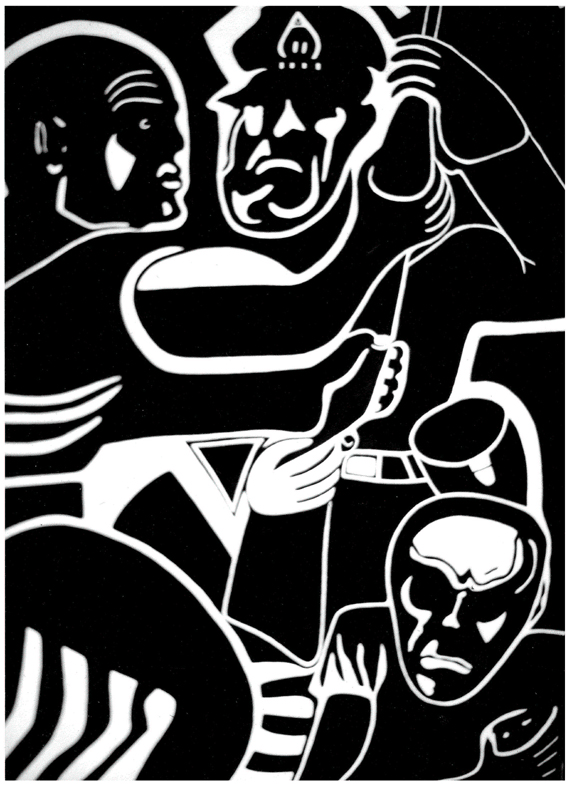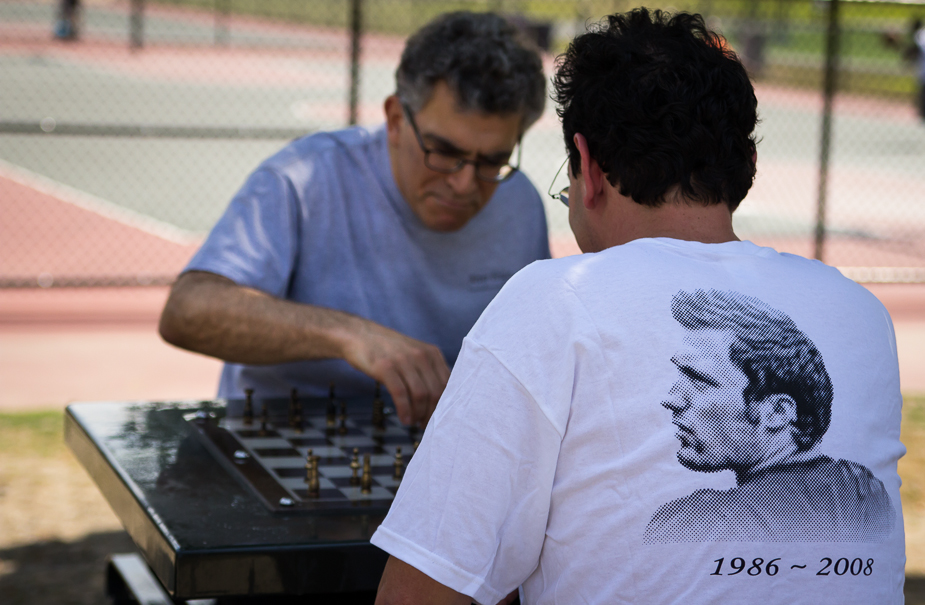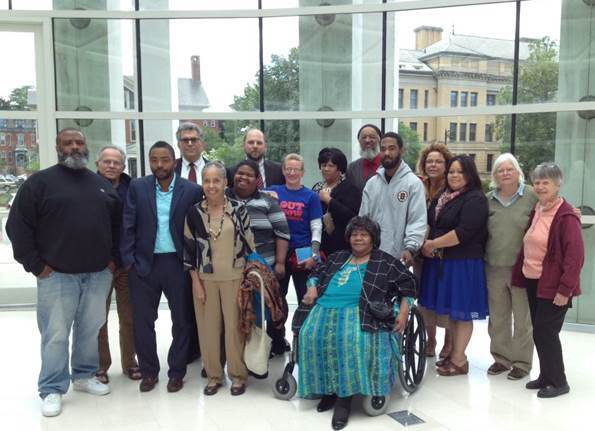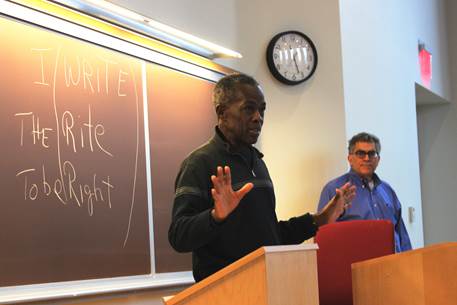Police Misconduct
Our police misconduct lawyers handle cases involving false arrest, excessive force, police brutality, unlawful shooting, unconstitutional search and seizure, illegal strip search, police cover-up, and wrongful convictions. To read about ways to complain about police misconduct, click here.
UNREASONABLE OR EXCESSIVE USE OF FORCE, OR POLICE BRUTALITY
Every person has the constitutional right not to be subjected to unreasonable or excessive force by law enforcement officers. However, a police officer has the right to use force that is objectively reasonable to make an arrest or that is necessary for self-defense. When officers exceed their authority to use force, we can help. Some of the cases we have handled include the following:
Beating after a police pursuit  Art by Lawyer Johnson, a client who created this piece while he was wrongfully imprisoned
Art by Lawyer Johnson, a client who created this piece while he was wrongfully imprisoned
After a police pursuit, a man was pulled from his car and brutally beaten by Falmouth and Massachusetts police officers. He sustained a broken jaw, which required several operations to repair, as well as fractures to his cheekbone and his ribs. The Falmouth defendants settled the client's claims against them for the full amount of their insurance coverage. The Massachusetts State Police paid an additional amount.
Assault with a flashlight
A Boston police officer struck a young man in the mouth and head with a police flashlight. The man was not arrested or charged with any crimes. He needed twelve stitches to close the wound in his head and crowns to repair the damage to his teeth. We negotiated a settlement.
Use of a chokehold
A man was arguing with another patron at a restaurant. A Chelmsford police officer pulled him to the ground from behind using a chokehold and then put a knee to his neck, causing a non-displaced fracture of his Adam's apple. The case settled.
Abuse of a homeless man
A seventy-three-year-old man was taken into custody by an MBTA police officer. When the man tried to read the officer's badge number, the officer punched him in the face. While the man was in lockup, the officer prodded him with a collapsible baton. No criminal charges were brought against the client. Officers tried to cover up the incident by denying that they had held the client. We obtained videotape of the holding cell, which proved that the plaintiff was in custody. We reached a settlement with the MBTA.
"Bad apple" police officers
Lynn police officers were called to break up a loud party. The plaintiff and his friend had been drinking. When the police officer told him to leave, the plaintiff explained that he was waiting for his ride. The officer placed him under arrest. The plaintiff explained that he was recovering from shoulder surgery and asked to be handcuffed in the front. Instead, the officer cuffed him behind his back and pulled up on the handcuffs, re-separating his shoulder. The officer has many civilian complaints filed against him alleging brutality. The jury awarded the plaintiff $58,700 in damages. After adding attorneys’ fees paid by the defendant, the total was $112,000.
We sued the same officer again when he fractured the arm of a woman whose family had called the police for help in getting her medical attention. The police officer twisted her arm, resulting in a spiral fracture. The City of Lynn ultimately settled the case. After the second suit, the officer was finally fired from the police force.
In a different town, a police officer grabbed a young man’s arm and fractured his elbow without any lawful reason to touch him. Our client needed four operations to repair his elbow. He was not arrested or charged with any crimes, and the police officer never filed a written report about the incident. The town fired the police officer. We negotiated a confidential settlement.
WRONGFUL DEATH
We represent the families of people who die because of the actions or inaction of police officers or prison guards. Law enforcement officials have caused the death of our clients’ loved ones by using unreasonable force and/or failing to provide desperately needed medical care, showing indifference to the medical needs of the person in their custody.
 Howard Friedman and David Milton play chess at the chess table that was erected by the David Woodman Foundation in the Back Bay Fens neighborhood of Boston. Before his death, David enjoyed playing chess and he often played with people who were homeless.
Howard Friedman and David Milton play chess at the chess table that was erected by the David Woodman Foundation in the Back Bay Fens neighborhood of Boston. Before his death, David enjoyed playing chess and he often played with people who were homeless.
David Woodman
David Woodman was a twenty-two-year-old man who was walking home from the Fenway Park area in June, 2008 after the Boston Celtics won the NBA championship. As David passed a group of police officers, he was arrested for carrying an open container of beer. Witnesses reported that police officers slammed David to the ground. David was held by the police until emergency medical technicians arrived. When the EMTs arrived, David was not breathing, he had no pulse, and his body was blue and cold. He suffered a cardiac arrhythmia and brain damage. David died at the hospital 11 days later.
We negotiated a $3 million settlement without filing a lawsuit. This settlement will help David’s family honor his life through the David Woodman Foundation. David’s family states, “David cared deeply about people who are poor, homeless or looked down on by society. The foundation started in his name will continue David’s work by providing empathy, compassion and support to people who are often ignored in this world.”
FALSE ARREST
The Fourth Amendment of the U.S. Constitution provides that a person has the right to be free from unreasonable seizures. A person may not be arrested unless the police officer has probable cause to believe that the person has committed a crime. Some false arrest cases that we have brought include the following:
False drug trafficking charges
An innocent man was arrested by Boston police detectives and charged with trafficking cocaine. The client alleged that the police officers lied about finding cocaine. One of the detectives was indicted in federal court for conspiracy to violate civil rights; he pled guilty and went to prison. The plaintiff alleged that the City of Boston was legally responsible for the detective's actions because it failed to properly supervise him and other officers, enabling them to file false affidavits in support of search warrants and to arrest people without probable cause in order to steal money from the criminal defendants. The case settled.
Racial profiling
A young African American man who worked at Massachusetts General Hospital was unlawfully arrested by private security based on his race. He was charged with assault and battery on a police officer, disturbing the peace, and possession of a dangerous weapon. These charges were dismissed at the request of the prosecution. The case settled.
Falsely arrested after asking for badge number
Our client was arrested by an off-duty police officer while he was collecting downed tree branches to use as fire wood. Our client questioned whether the defendant was actually a police officer because the officer was dressed in civilian clothing and driving his personal vehicle. When our client asked to see the officer’s badge, the officer responded by shouting, swearing, and throwing our client to the ground. This case settled shortly after we filed the lawsuit.
Arrested and charged with a crime although the victim told police she was not involved
Our client, a high school student, was arrested and charged with armed robbery. She was in the vicinity of the crime but was not involved in any criminal activity. The victim of the robbery told the police that our client was not involved and did not do anything, but the police arrested her anyway. The criminal charges were dismissed after the prosecutors spoke to the victim. This case settled.
ILLEGAL STRIP SEARCH
The Fourth Amendment of the U.S. Constitution provides that a person has the right to be free from unreasonable searches. A person may not be subjected to a strip search just because that person is in custody. Rather, the police officer must have a reasonable suspicion about that person to justify a strip search. Among the strip search cases we have brought are the following:
Perverted police officer
We represented two teenage girls who, in separate incidents, were forced by Wareham police officer Scott Flanagan (who was under the supervision of Sergeant Jeffrey Perry) to remove their clothing in the open for his personal gratification. The officer pled guilty to violating the girls' civil rights. One case went to trial; the jury awarded the girl $50,000 against the Town of Wareham, the officer’s employer. The other case settled for a similar amount. The Town of Wareham also paid plaintiffs' costs and attorneys’ fees.
Class action lawsuits
Through class action lawsuits, we have secured settlements for many people who were illegally strip searched in jails or correctional facilities. These class actions include Mack v. Suffolk County, Connor v. Plymouth County, Nilsen v. York County, Ryan v. Garvey, and Garvey v. Macdonald.
Strip search after arrest on minor motor vehicle charge
A woman who was strip searched after an arrest on a minor motor vehicle default warrant obtained a settlement.
Strip search in a room with a window
A woman prisoner at MCI-Framingham was strip searched in a room with a window. This was a routine strip search before a drug test. The case settled. The Commissioner told the Superintendent to never do that again.
WRONGFUL CONVICTION
We represent people who, as a result of police misconduct, were convicted of crimes they did not commit. This firm was among the first to file claims under the Massachusetts erroneous conviction statute for people who were wrongfully convicted. To learn more about the problems faced by people who were wrongfully convicted and the need for meaningful post-release services, read this article from the Boston College Third World Law Journal: Beyond Monetary Compensation: The Need for Comprehensive Services for the Wrongfully Convicted.
Charles Wilhite
 Charles Wilhite (third from left) poses with his family, attorneys, and incredible community supporters after a successful court hearing on June 9, 2016. This case involves two Springfield police officers threatening and coercing witnesses in order to falsely convict Mr. Wilhite. The judge denied the officers’ Motion for Summary Judgment and called the officers’ legal arguments “unpersuasive.” Mr. Wilhite later settled his civil rights case against the officers and the City of Springfield.
Charles Wilhite (third from left) poses with his family, attorneys, and incredible community supporters after a successful court hearing on June 9, 2016. This case involves two Springfield police officers threatening and coercing witnesses in order to falsely convict Mr. Wilhite. The judge denied the officers’ Motion for Summary Judgment and called the officers’ legal arguments “unpersuasive.” Mr. Wilhite later settled his civil rights case against the officers and the City of Springfield.
Charles Wilhite was wrongfully convicted of first-degree murder in 2010. We represented Mr. Wilhite in his civil rights case against two Springfield police officers and the City of Springfield. We also represented him in his compensation claim under state law for his wrongful conviction. Both cases settled.
Mr. Wilhite’s wrongful conviction resulted from the grossly improper identification procedures used by the two officers and from the City of Springfield’s policies, customs, and practices. There was no physical evidence against Mr. Wilhite. Five witnesses told police that the shooter was a light-skinned Hispanic man. The police officers failed to investigate these leads and instead built a case against Mr. Wilhite, who is African American. Mr. Wilhite was convicted in part due to the testimony of two witnesses who later recanted and said that they had only identified Mr. Wilhite because of police pressure.
Neil Miller
As local counsel with firm of Cochran, Neufeld and Scheck in New York, we represented Neil Miller, a man who spent ten years in prison before he was exonerated by DNA evidence. Mr. Miller reached a landmark $3.2 million settlement with the City of Boston after alleging civil rights violations, police misconduct, and misconduct at the police lab that resulted in his wrongful conviction.
Lawyer Johnson
Mr. Johnson was wrongfully convicted of a murder he did not commit. Originally sentenced to death, Mr. Johnson served ten years in prison before being freed. Racial bias permeated Mr. Johnson’s trials. He describes this ordeal as a “legal lynching.” Our firm represented Mr. Johnson on his compensation claim under state law for his wrongful conviction. That case settled in 2006.
 Lawyer Johnson speaking to students at Northeastern University School of Law in 2016
Lawyer Johnson speaking to students at Northeastern University School of Law in 2016
Mr. Johnson seeks speaking opportunities so he can share the story of his wrongful conviction and his career as an activist. Because he was wrongfully sentenced to die, Mr. Johnson speaks out against the death penalty and hopes to inspire conversations about changing our criminal legal system. Please contact our firm if you would like to invite Lawyer to speak at your event.
Anthony Powell
We represented Anthony Powell, a man who was wrongfully convicted and imprisoned for nearly twelve years. Despite his innocence, Mr. Powell was found guilty of aggravated rape, kidnapping, armed robbery, and assault and battery by means of a dangerous weapon. He was finally exonerated by the court on March 28, 2004, after DNA evidence proved indisputably that he could not have perpetrated any of these crimes. Mr. Powell alleges that the City of Boston failed to train its police officers properly and that members of the Boston Police Department used unduly suggestive identification procedures, withheld exculpatory evidence, and falsified forensic evidence. This case settled for an amount which is confidential.
Limone v. United States
Howard Friedman was part of a group of plaintiffs’ lawyers that the Boston Globe called a “dream team” in Limone v. United States, a case against the federal government based on FBI agents’ participation in framing four innocent men for a 1965 murder. The verdict of over $101 million is the largest sum ever awarded in a malicious prosecution case. The case was based on formerly secret FBI memos revealing that the government’s key witness in the murder trial—a mob hit man and FBI informant known as Joseph “The Animal” Barboza—had falsely accused the men to protect the real killer, another FBI informant. Plaintiffs alleged that FBI agents not only knew that Barboza’s testimony was false but encouraged him to lie and then conspired to cover up the misconduct for decades. As a result, two of the wrongly convicted men spent more than thirty years in prison; the other two men died in custody after serving more than fifteen years for a crime they didn’t commit. We represented the son of one of the men who died in prison, obtaining damages for his loss of parental guidance and companionship.
TRANSGENDER RIGHTS
Transgender individuals are among the groups of people who experience higher rates of police violence. We represent transgender or gender non-conforming people who have experienced discrimination, wrongful arrest, or other violations at the hands of police officers.
Trans woman arrested for using the women’s bathroom
Our client, a transgender woman, was falsely arrested and subject to discrimination for using the women’s bathroom at a homeless shelter in Boston in 2010. At the police station, male police officers degraded our client by ordering her to remove her top and jump up and down, causing her bare breasts to jiggle for the officers’ amusement.
Our case alleged that the City failed to train its police officers how to treat transgender people. The City offered to have judgment entered against it shortly after we filed the complaint. Just a few months after we settled this case, the Boston Police Department announced a new policy that instructs officers how to properly interact with and respect transgender people.
Transgender people’s right to use public bathrooms and other public accommodations was strengthened in 2011 by a state law prohibiting discrimination based on gender identity. We use litigation to enforce these laws.
POLICE OFFICERS FIRED FOR LYING
Civil suits do not directly result in discipline of police officers. Discipline is imposed only by an internal police investigation. However, on rare occasions, a civil lawsuit can contribute to police officers losing their jobs. Some internal police investigations have found that officers should be fired because they lied at their depositions for civil lawsuits. Three officers we sued have been fired for untruthfulness.
David Williams
In January 2012, Boston police officer David Williams was fired for using unreasonable force (a chokehold) on our client Michael O’Brien, and for lying about his use of excessive force. This is a rare example of a police department finding a police officer guilty of brutality and terminating him for abuse of a civilian and dishonesty. But, Williams won an arbitration decision which returned him to work with back pay. The City of Boston appealed the decision to Superior Court, but the Court rueld that he must be reinstated.
The city of Boston paid $1.4 million to settle a civil rights lawsuit our firm brought on behalf of Mr. O’Brien, a victim of Williams’s brutality. Click here to read more about this police brutality lawsuit.
Marcos Freitas
Somerville police officer Marcos Freitas was terminated for untruthfulness and conduct unbecoming a police officer. Freitas’s misconduct first surfaced in August 2008, when he took a polygraph test a part of his application to the police department in Austin, Texas. During the test, he said he sometimes used “creative writing” in his police reports and that on at least two occasions he confiscated marijuana from a suspect then gave the marijuana to a friend. In September 2008, he agreed to a 15-day suspension for violating department rules.
In February 2010, Attorney David Milton took the deposition—sworn testimony—of Freitas as part of a police brutality lawsuit we filed against him. Attorney Milton asked Freitas about one of the marijuana incidents. Contradicting his earlier statements, Freitas said that he did not give the marijuana to his friend, but merely showed it to her then disposed of it.
After Attorney Milton urged the City of Somerville to review Freitas’s contradictory statements, the Somerville Police initiated an investigation. The investigation concluded that Freitas had lied. He was terminated in March 2010, after being a police officer for eight years. He appealed in August 2011, and his appeal was denied in June 2012 by the Civil Service Commission. The decision states, “Unfortunately, it is overwhelming clear to me that Mr. Freitas, either in his statements to the Police Captain and Lieutenant or his deposition or in his testimony before the Commission, has made the same type of “creative” statements that he acknowledged making in at least one of his police reports.”
Click here to read the decision of the Civil Service Commission.
Click here to read about the police brutality lawsuit we brought against Freitas.
Joseph LeMoure
In 2000, a young man alleged extended his middle finger as the car he was riding in passed Boston police sergeant Joseph LeMoure. The sergeant followed the car, pulled out the passenger and assaulted him. When LeMoure learned that the Boston police Internal Affairs Department had located a civilian witness to the assault, he enlisted a patrol officer he supervised, Joseph Politio, to get witnesses to lie by claiming they saw the incident and Sergeant LeMoure did not use excessive force when these people were not there.
The witnesses lied in the departmental disciplinary hearings. After we filed suit, Sergeant LeMoure and the witnesses lied under oath at depositions. Then the FBI began an investigation on the incident and federal criminal charges were brought against LeMoure and Politio. In 2004 Sgt. LeMoure was convicted of perjury for lying in the deposition and he and officer Politio were convicted of encouraging witnesses to lie at depositions and to the grand jury. LeMoure was sentenced to four years in prison; Politio was sentenced to three years in prison.
If he had not been convicted, Sgt. LeMoure would still be a police sergeant. The police department ruled he should be demoted and suspended for one year. He won a civil service appeal finding termination was too severe a punishment allowing him to return as a sergeant after a nine month long suspension without pay. The civil suit for excessive force settled.
Follow these links to learn more about police perjury and testilying.
